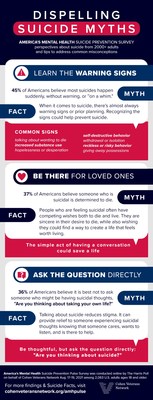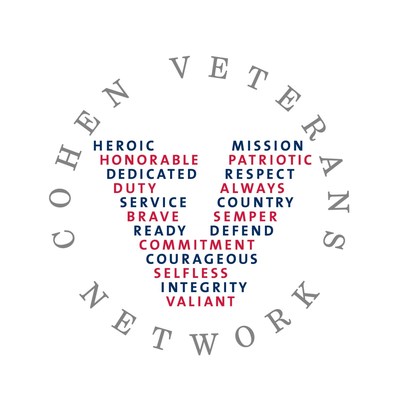|
02.09.2021 23:08:00
|
Cohen Veterans Network New Survey Reveals Americans' Misconceptions About Suicide Prevention
STAMFORD, Conn., Sept. 2, 2021 /PRNewswire/ -- Today, Cohen Veterans Network (CVN), a not-for-profit philanthropic organization that serves post -9/11 veterans, active duty service members and their families through a nationwide system of mental health clinics, revealed findings of its America's Mental Health Suicide Prevention Pulse Survey, which looked at Americans' general knowledge of suicide prevention. The survey coincides with the network's #AskTheQuestion public awareness campaign, which encourages people to take action if they're concerned that someone they know may be having thoughts of suicide. September marks Suicide Prevention Month intended to bring awareness to the topic and promote suicide prevention best practices.
"Suicide prevention is a top priority for Cohen Veterans Network," said Cohen Veterans Network President and CEO Dr. Anthony Hassan. "The stigma associated with suicide and seeking help are significant barriers to treatment. With this survey, we wanted to address myths that exist around suicide and misconceptions that stand in the way of suicide intervention. Our goal is to help empower people to take action should they be concerned about someone they know."
The survey of more than 2,000 U.S. adults conducted by The Harris Poll, offers an overview of Americans' understanding of suicide prevention. Key findings along with comparative facts include:
- Over one-third (36%) of Americans believe it is best not to ask someone who might be having suicidal thoughts, ''Are you thinking about taking your own life?''
- FACT: Talking about suicide reduces stigma. It can provide relief to someone experiencing suicidal thoughts knowing that someone cares, wants to listen, and is there to help.
- Nearly one-third (29%) of Americans believe asking someone if they are thinking about taking their own life may make them more likely to kill themselves.
- FACT: "Asking about suicidal thoughts or feelings won't push someone into doing something self-destructive. In fact, offering an opportunity to talk about feelings may reduce the risk of acting on suicidal feelings," according to the Mayo Clinic.
- Nearly half (44%) of Americans say that if they had reason to believe that someone they know might be having thoughts of suicide they would NOT be comfortable asking them ''Have you thought about killing yourself?''
- FACT: You want to be compassionate but ask direct questions. Asking directly can help you better assess if the person you are concerned about is in danger of acting on thoughts of suicide.
- One-third (34%) of Americans say that if they had reason to believe that someone they know might be having thoughts of suicide, they would NOT be comfortable asking them ''Do you have firearms in the house?''
- FACT: Firearms are the most lethal suicide method. Eighty-five to ninety percent of suicide attempts with a firearm are fatal. "Temporarily removing lethal means such as firearms from someone in crisis greatly reduces the likelihood of that person dying by suicide," according to the American Foundation for Suicide.
"The idea of asking someone directly if they are thinking about taking their own life may seem counterintuitive for some," said Hassan. "But we know that talking about suicide helps to reduce stigma and can create an opportunity for those struggling to seek help. We want to encourage people to #AskTheQuestion. It could help to save a life."
The survey additionally looked at a number of common suicide myths. It found:
- Nearly half (45%) of Americans believe that most suicides happen suddenly, without warning or ''on a whim.''
- FACT: Most people who attempt to kill themselves will display warning signs. Recognizing the signs could help prevent suicide. Warning signs include, talking about wanting to die or wanting to kill themselves, withdrawing from family and friends, giving away important possessions, putting affairs in order, such as making a will and more.
- Over one-third (37%) of Americans believe someone who is suicidal is determined to die.
- FACT: People who are feeling suicidal often have competing wishes both to die and to live. They are sincere in their desire to die, while simultaneously wishing they could find a way to create a life that feels worth living.
- Over one-third (36%) of Americans believe that people who die by suicide are selfish and take the easy way out.
- FACT: "Typically, people do not die by suicide because they do not want to live – they die by suicide because they want to end their suffering," according to the National Alliance on Mental Illness (NAMI).
- One-third (32%) of Americans believe that people who talk about suicide do not mean that they will actually go through with killing themselves.
- FACT: One of the warning signs that someone is considering suicide is that they talk about suicide. They may make such statements as "I can't live like this anymore" or "I wish I were dead."
The survey also captured a snapshot of Americans' perception of the veteran suicide crisis. It found:
- Four-in-ten Americans (39%) believe that veterans are 10x more likely to die by suicide than the general population, while over one-third of military-connected Americans (37%) believe that veterans are 5x more likely to die by suicide than the general population.
- FACT: The suicide rate for veterans is 1.5x higher than that of non-veterans.
"There is a veteran suicide crisis in our county with the veteran suicide rate at 1.5 times that of the general population," said Cohen Veterans Network Vice President and suicide prevention expert Dr. Caitlin Thompson. "It is concerning that Americans, particularly those that are military-connected, believe it to be that much greater. This speaks to this misperception that exists that 'all' veterans are suicidal or damaged. But veterans need to know that suicide is not their inevitable fate. There are options and resources available to them to help them through times of crisis, as well as times that may lead to a crisis. Veterans who experience mental health challenges can and do go on to live healthy and happy lives."
CVN provides high-quality, accessible mental health services to post-9/11 veterans, active duty service members and military family members through its 19 Steven A. Cohen Military Family Clinics across the country. Treatment is available for a wide variety of mental health challenges including PTSD, depression, anxiety, adjustment issues, anger, grief and loss, family issues, transition challenges, relationship problems, and children's behavioral problems. Care is available in person or via CVN Telehealth, face-to-face video therapy.
For more survey findings, go to cohenveteransnetwork.org/amhpulse.
About the Survey
Cohen Veterans Network is committed to increasing access to mental health care services. America's Mental Health Suicide Prevention Pulse Survey was conducted by The Harris Pollon behalf of Cohen Veterans Network and included 2,063 American adults aged 18 or older who participated in an online survey between August 17 - 19, 2021. Results were weighted to Census targets for education, age/gender, race/ethnicity, region, household income, and propensity to be online were adjusted where necessary to bring them in line with their actual proportions in the population.
About Cohen Veterans Network
Cohen Veterans Network (CVN) is a 501(c)(3) national not-for-profit philanthropic organization for post-9/11 veterans, active duty service members and their families. CVN focuses on improving mental health outcomes, operating a network of outpatient mental health clinics in high-need communities, in which trained clinicians deliver holistic evidence-based care to treat mental health conditions. It was established in 2016 by philanthropist Steven A. Cohen with a commitment of $275 million to build the network. There are currently 19 Steven A. Cohen Military Family Clinics nationwide.
![]() View original content to download multimedia:https://www.prnewswire.com/news-releases/cohen-veterans-network-new-survey-reveals-americans-misconceptions-about-suicide-prevention-301368828.html
View original content to download multimedia:https://www.prnewswire.com/news-releases/cohen-veterans-network-new-survey-reveals-americans-misconceptions-about-suicide-prevention-301368828.html
SOURCE Cohen Veterans Network
 Der finanzen.at Ratgeber für Aktien!
Der finanzen.at Ratgeber für Aktien!
Wenn Sie mehr über das Thema Aktien erfahren wollen, finden Sie in unserem Ratgeber viele interessante Artikel dazu!
Jetzt informieren!

